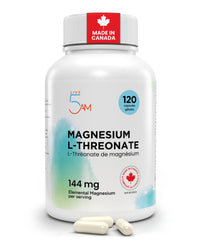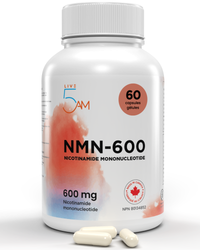What Exactly is Magnesium?
Magnesium is an essential mineral, which means your body can't produce it on its own – you need to get it from your diet or supplements. It's the fourth most abundant mineral in your body, with about 60% found in your bones and the rest distributed throughout your muscles, soft tissues, and blood.
Think of magnesium as a behind-the-scenes superhero in your body. It doesn't get as much attention as calcium or iron, but without it, many crucial bodily functions would grind to a halt.
Why Do You Need Magnesium?
Now that we know what magnesium is, let's explore why it's so important for your health. Magnesium is involved in a wide range of bodily functions, including:
1. Energy Production: Feeling tired all the time? Magnesium might be the culprit. It plays a key role in converting the food you eat into energy your cells can use. Without enough magnesium, your body struggles to produce the energy it needs to function optimally.
2. Muscle and Nerve Function: If you've ever experienced a muscle cramp, you know how uncomfortable it can be. Magnesium helps your muscles relax and contract properly. It also helps your nerves send and receive messages throughout your body.
3. Bone Health: While calcium often steals the spotlight when it comes to bone health, magnesium is equally important. It helps regulate calcium levels and is crucial for maintaining strong bones and teeth.
4. Heart Health: Your heart is a muscle, and like all muscles in your body, it relies on magnesium to function properly. Adequate magnesium intake has been linked to a lower risk of heart disease and high blood pressure.
5. Mood Regulation: Feeling stressed or anxious? Magnesium might help. It plays a role in regulating neurotransmitters, which are chemicals in your brain that affect mood. Some studies have found that magnesium supplementation can help reduce symptoms of depression and anxiety.
6. Blood Sugar Control: Magnesium helps your body process glucose (sugar) effectively. This is especially important for people with or at risk for type 2 diabetes.
7. Protein Synthesis: If you're trying to build muscle or recover from an injury, magnesium is your friend. It's necessary for the production of proteins, the building blocks of your body.
Are You Getting Enough Magnesium?
Despite its importance, many people don't get enough magnesium in their diet. The recommended daily intake varies by age and sex, but generally, adult men need about 400-420 mg per day, while adult women need 310-320 mg (more if pregnant).
Signs of magnesium deficiency can include:
- Fatigue and weakness
- Muscle cramps or twitches
- Mental health issues like apathy or depression
- Osteoporosis
- High blood pressure
- Irregular heartbeat
If you're concerned about your magnesium levels, it's best to consult with a healthcare professional. They can test your levels and advise on whether you need to increase your intake.
How Can You Get More Magnesium?
The good news is that magnesium is found in a variety of delicious and healthy foods. Some excellent sources include:
- Leafy green vegetables (spinach, kale, collard greens)
- Nuts and seeds (almonds, pumpkin seeds, sunflower seeds)
- Whole grains (brown rice, quinoa, oatmeal)
- Legumes (black beans, chickpeas, lentils)
- Dark chocolate (the darker, the better!)
- Avocados
- Bananas

If you're having trouble getting enough magnesium from your diet alone, supplements are available. However, it's always best to consult with a healthcare provider before starting any new supplement regimen.
The Bottom Line
Magnesium may not be the most talked-about nutrient, but it's certainly one of the most important. From keeping your heart healthy to helping you sleep better at night, magnesium plays a crucial role in numerous bodily functions. By ensuring you get enough of this mighty mineral through a balanced diet rich in whole foods, you're taking a significant step towards better overall health and well-being.
Remember, your body is a complex machine, and magnesium is one of the key components that keeps it running smoothly. So next time you're planning your meals or considering your nutritional needs, don't forget about magnesium – your body will thank you!







